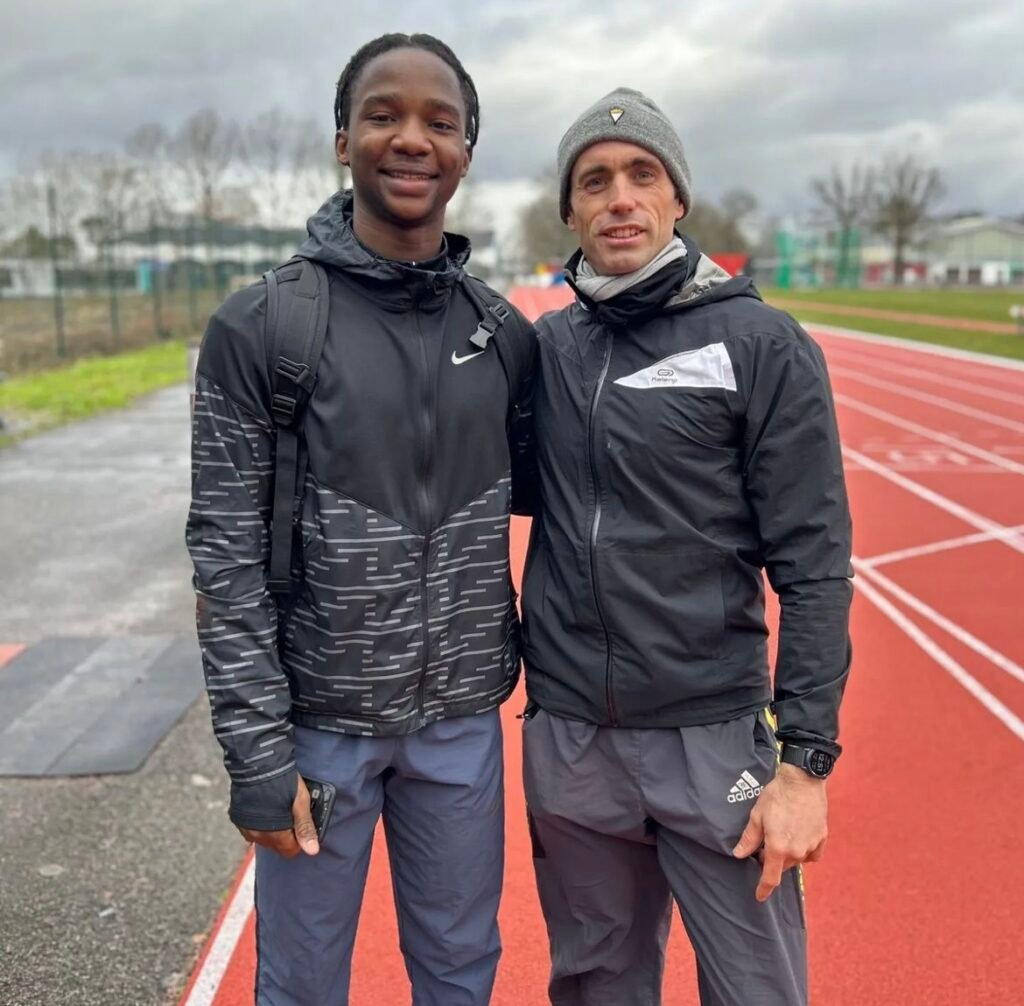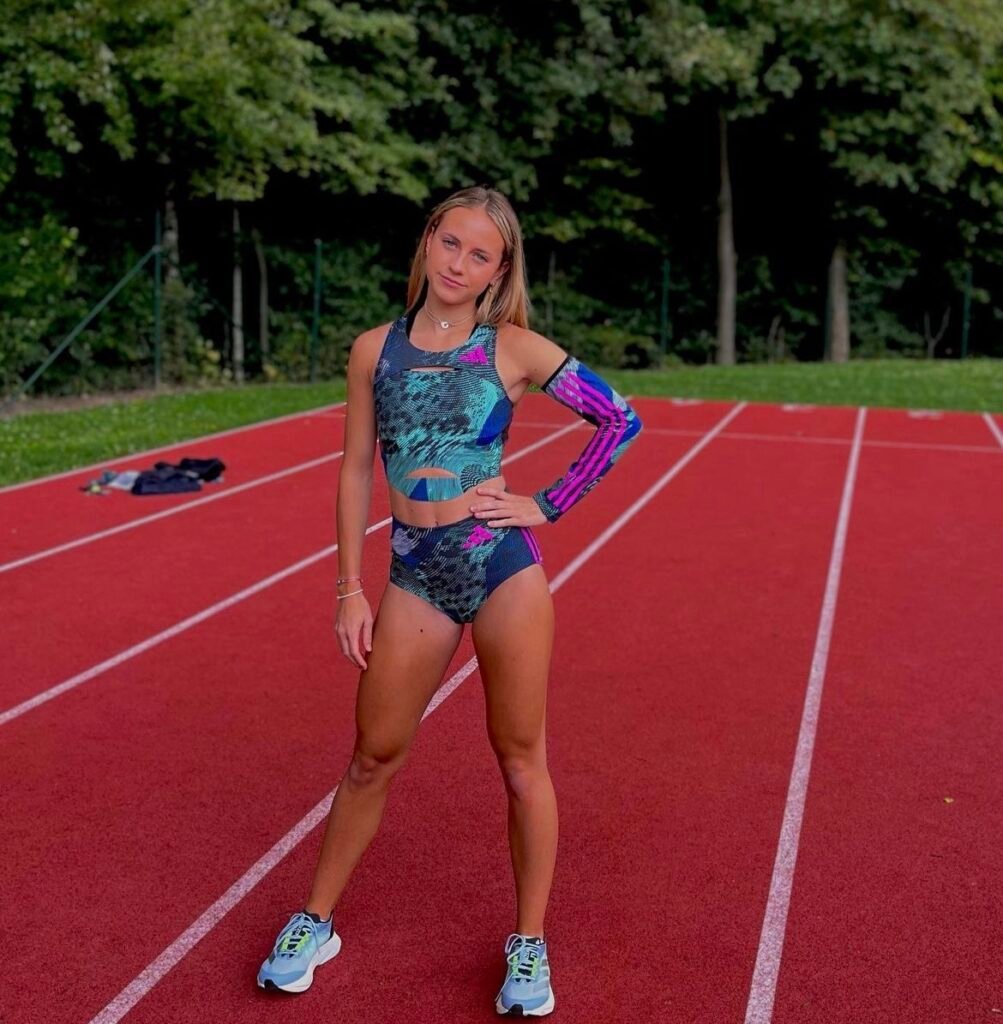Written by Trackandmemes, January 11, 2024
We had already met Cédric Motieh for the first time in the Magazine, describing him as the athlete who shocks the old-timers. In fact, on Saturday January 6th in Louvain-la-Neuve, he shattered his personal best over 60 metres to post a brand-new performance of 6 seconds and 86 hundredthscurrently ranked 5th U20 performance in Europe for this indoor season.
But recently, Cédric hasn't just made meteoric progress... There's been change, too. A new collaboration with a coach that Belgium already knows, François Gourmet.

Let's start with your change of coach, Cédric. What prompted this decision?
One of the main reasons behind my move to François was that I felt the need for a change during the previous season. I felt it had been a while since I'd reached my full potential during my training sessions. I felt like I was going round in circles, like something was missing.
I wanted more, but I couldn't necessarily make my former coach understand, because communication wasn't ideal.
Which, by the way, frustrated me enormously. And it ended up influencing my performance.
It was a choice I thought about a lot, but one that made sense to me.
What's your new vision? Well... For you and your new coach, François Gourmet?
When I chose François as my coach, I wanted to look further ahead. A career coach, I hope. Someone who's as motivated as I am, and with whom communication isn't a problem or a hindrance. It's this long-term vision that I want to keep in mind.
How did your training go before, in concrete terms?
Things went quite well for several years. My program was coherent and varied. But it started to become less and less so.
I was making progress season after season, but for that to continue, I needed better coaching. Last season was the most complicated. Because, in addition to my individual training, there was also relay training for the U20 European Championships. I found myself in a situation where I had to manage my various training sessions, and my classes since I was still in rhetoric. I was mentally exhausted, because, as I said earlier, without communication with your coach, it's very complicated to succeed.
And how would you describe the communication you currently have with your coach? What kind of relationship do you have?
François is a very open person. I'm often amazed at how dedicated he is to his athletes. He knows how to adapt to each and every one of them. We communicate very well. I'm very happy to be able to work with him.
François Gourmet, over the past two years, a number of athletes have decided to come and develop alongside you, notably Callie Nzukou who has a record of 11''62 in the 100 meters, and now Cédric who is undoubtedly very promising. What do you do to ensure that your athletes make the best possible progress?
I rely a lot on communication and listening. For example, with Callie, we talk a lot via WhatsApp, which allows me to individualize training as much as possible. You don't train for one event, you don't train for the 100 meters and say that to run the 100 meters you have to do this program or that program. Of course, we can draw inspiration from programs, but Marine and Callie, for example, have very different ways of training, because they have different qualities. What also makes the difference is the athlete's confidence in her coach. And if there's communication, then there's more trust. It's important that the athlete isn't afraid to talk to his coach.

How do you adapt your sessions?
If the athlete is tired, I can very quickly remove a training session. I'm not going to force things. It's better for him to rest so that the training can be favourable.
And what about the organization of training schedules?
I know all my athletes' exam schedules. I know which days I can train them on the track, which days they can train at home, and which days they've asked to be rested. It's through this exchange that we try to optimize training. I don't set specific days for running training, for example, or for weight training. It's different for every athlete.
Now, when you have a group of athletes, you can't separate them all. So I try to arrange for them to get together during certain sessions. But the main objective is to create a program that is precisely and individually defined for each athlete. I also set up a strengthening program that the athlete must do at home to avoid injury.
Cédric, speaking of schooling... In terms of your studies, you recently told us that you wanted to go into the medical field. How are things going on that front? Are you able to manage your classes and training properly?
I'm studying physiotherapy at the HEPL in Liège. Being a student athlete and having to train at least five times a week isn't easy. My days are long and full. But I know that with François, if things go wrong at any given time, there's always a way of adapting. For the two of us to work together, we have to find arrangements and put certain things in place.
Do you have a specific goal for this season?
Yes, we defined several goals at the start of our preparation. The goals would be to improve all my personal bests and my running technique. But we don't put any pressure on ourselves. I keep in mind that you always need time to adapt when you change coaches. Even if one of our objectives has already been achieved over 60 metres at the start of January at the provincial championships in Louvain-la-Neuve.
And you, François, do you have any special hopes for the future?
For Cédric, I'd like him to flourish in athletics. That he can make the most of his qualities and talent. I'd like him to be happy to come to training, to go on courses, or even to compete.
But if I had to give one wish for myself... I'd like to continue to make a living from my passion. Training specialist sprinters over 60m, 100m, 200m and 400m, and even 400m hurdles. I work one day a week at Décathlon. The rest of the time, I'm paid in part by the Seraing club, but I also live off Julien and Robin's grants. As they're both top-level sportsmen and women on the payroll, they get a grant for their coaching. But they also get a grant for everything else: training courses, physiotherapy, mileage...
As Julien is approaching 32 and Robin is already 30, they don't have many years left in their careers. I'd like to try and find a group or at least another top-level athlete so I can continue to make a living from my passion. And if possible, continue this athletic project in Seraing. An indoor hall is being built right next to the track. If there's a possibility of building a sprint center, it could be interesting for me in the future... Translated with DeepL.com (free version)
What do you think makes the difference as a coach?
I don't use the stopwatch much. Of course, when it comes to long-distance sessions, I do give a range. But I'm not going to have fun timing every sprint, because I prefer to concentrate on technique.
In terms of repetitions, I don't use a lot of volume. If an athlete does six starting blocks in a workout, I consider that a lot.
And for this kind of sprint training, I don't take recovery. The athlete goes when he feels ready. I can give a few extra minutes if I want to see quality again, even to the point of removing one or two sets from what was planned.